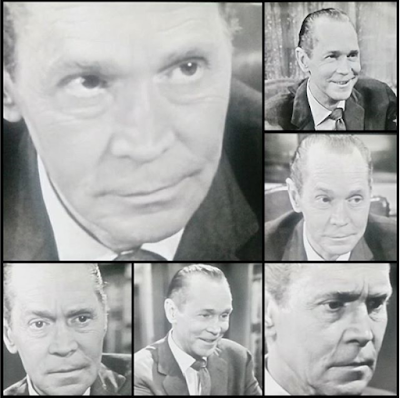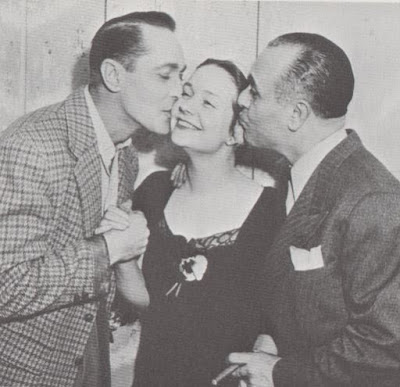 |
| Franchot in the 1930's. Source: my collection. |
September 18th marks the 49th anniversary of Franchot's passing from lung cancer. Though our lifetimes didn't coincide, Franchot, for a handful of years now, has been a major part of mine.
This summer as part of a reading challenge, I read seven film-related biographies—on Dolores del Rio, Lupe Velez, Judy Holliday, Mary Martin, Glenn Ford, Dana Andrews, and Lew Ayres. I enjoyed them all and I found I admired all of the subjects for one aspect or another. The books inspired me to watch more of these actors' works and truly appreciate them in a new light. Recently, I was having a conversation about my readings and pondered the reasons why, despite the accomplishments and intriguing lives of other stars, they do not grab me the way Franchot has. Even if a full biographical book on Franchot was published by someone and I read it, I feel like my hunger for researching him would remain unquenched. I never hit that point of believing my examination of Franchot is complete. I've been actively researching for several years now and I have so many unanswered questions and gaps in his timeline. But I love the hunt! There's no better feeling in this world than to stumble across the one photo or interview you never expected to uncover.
But it's not just the thrill of research that keeps me tethered to Franchot—it's the man himself, of course. I remain fascinated by his life and his work. Like many film fans, I've had phases of intense devotion throughout my life. There was my childhood and pre-teen fascination with Shirley Temple and Doris Day which transformed into a teenage obsession with what I'd term the "Hollywood Big Hitters": Marilyn Monroe, James Dean, Audrey Hepburn, and Natalie Wood. My college years were spent delving into books on Greta Garbo and Ava Gardner and Rita Hayworth. As an adult, the people who've interested me the most are Franchot, Loretta Young, Sylvia Sidney and Warren William. So yes, I've traveled through the experience of researching one star or another, but other than Natalie Wood and Loretta Young—who have remained and I feel always will remain lifelong fixations for me—Franchot is the star that I cannot escape (don't worry, it's a prison of total happiness!) And I've come to the conclusion that there are several reasons as to why:
Screen Quality
In my opinion, he possessed a different screen quality than other male actors of that time. His performances speak to me in a distinctive way that those of his contemporaries fail to do. There's a gentle and steadfast quality in his performances and unmatched sincerity in his delivery of his characters. I believe in every single character he played and find them compelling. This is especially true in films like Gentlemen Are Born, The Bride Wore Red, and Three Comrades. I've never personally identified with the performances of another male actor of that generation until Franchot came into my life.
Polarity in Career Choices
The polarity in his career choices can be astounding. Franchot expressed that he felt most at home on the New York stage and received more critical acclaim and professional respect in that area. In interviews, he said he liked being a working character actor and that he wished to do realistic, gritty plays. Franchot was never quite comfortable with the publicity angle of Hollywood and was rather private. In spite of all this, Franchot left the Group Theatre in order to pursue a very public Hollywood career. In the early interviews, Franchot continued to say he would return to the stage and would form no lasting ties in Hollywood. But the truth is, Hollywood always had his heart. The movie star lifestyle reeled him back to films time and time again, even the lower budget and lower publicized ones.
His Personality
There's a kindness and tenderness in Franchot as a person. You can hear it in the words of his well-articulated interviews and in the reflective memories of those who knew him. Those who knew him seemed to like him and respect him. They enjoyed working with him and commented on how modest Franchot was about his own talent—and they talked of what a natural talent he had. Despite growing up in a successful, wealthy family, Franchot identified with the everyman. He supported causes that protected the people who did not have the fortune or status to protect themselves.
He's a Survivor
Although he was a quiet, private man who enjoyed classical music, reading, and would rather be fishing and hunting in the Canadian woods than anywhere else, a nightlife of beautiful (sometimes notorious) women, scotch, and dancing was also a major pastime in Franchot's life. He's an interesting case to me, because he was an intricate human being with conflicting needs and wants. He didn't want publicity, but he engaged in one of the most highly publicized relationships (i.e. trainwreck) in Hollywood with Barbara Payton. He could be incredibly self-destructive both personally (with his romantic liasons and heavy drinking) and professionally (accepting roles in B-movies that further typecast him instead of demanding important roles in substantial films.) Yet, he was a survivor. Despite being blacklisted and sometimes ridiculed and often misunderstood, Franchot kept working. He maintained his dignity and elegance through everything. He worked up until his death and he left an abundance of amazingly well-done performances for future generations. And it's his perseverance that, I think, keeps me permanently attached. I admire Franchot for not letting any disappointments tear him down. There were bumps in the road, but he continued to dedicate himself to his craft. In interviews he did in the 1960's, you never get the sense that Franchot has lost touch. He constantly says that he is so excited for the opportunities he has and that he's continuously working on his performances. Franchot comes across as thrilled to be a character actor on television. I like that. Despite wealth and fame, Franchot never adopted a superiority complex, never threw power in other's faces, and never felt like he was too good to learn and to improve.
He Wouldn't Mind It?
True, Franchot wasn't crazy about publicity and he was modest about himself. But I feel like he would appreciate my dedication. And I sense that older Franchot was more open to publicity than younger Franchot. In a 1966 interview with Janet Roach, Franchot was delighted to talk and said:
I could talk for hours about the tricks, but nobody asks me.
The first time I read that statement, it made me feel incredibly sad and it's stayed with me. More people should've interviewed him, should've asked him to share his thoughts in those later years. He seemed willing and ready to share his tricks of the trade and I regret that no one thought to pursue him on the record. I am happy that this blog does belatedly attempt to finally get Franchot on the record. I am by no means trying to assert that I am the biggest and best Franchot devotee out there, because I've met some wonderful people who share this common interest. But I do enjoy what I'm doing with this blog and how much I've learned about this dynamic man in the process. I like to think Franchot would get a kick out of it.
 |
| Franchot in the 1960's. Source: my collection. |
In concluding all the reasons why Franchot has captured me, I'd like to share again how actor Christopher Plummer characterized him. It's the description that fits the Franchot I've encountered and includes all of those anomalies in his being that make him such an interesting study:
Franchot had a weakness for the movies and a penchant for domineering, glamorous women...He seemed to search for this kind of self-destructive alliance, and alliance that could not but help inflict certain pain. Indeed, Franchot Tone was a handsome, sensitive, highly educated and tremendously talented gentleman who was, nevertheless, motivated and driven by pain. His hard living had somewhat diminished his former brilliance, but every so often his work showed strong evidence of great depth and nobility of spirit...His sense of humor, as one might guess, was seeringly self-deprecating, drawn as always from this inexplicable inner torment. These vulnerable qualities were to make his Chekovian performances (Uncle Vanya and A Moon for the Misbegotten), both of which I later saw, so memorable—a rare combination of lightness and poignancy...we shared an unspoken bond.
We were both romantics—incurable to the last—and our separate upbringings shared the same confusion of identity. He may have seen in me, occasionally, his younger self. I'm not sure and I wouldn't wish it on him; but I saw in him someone I could perhaps aspire to; not the hidden sad, pained man that was part of Franchot but the part he couldn't conceal, no matter how hard he tried, the part that was refined, noble and infinitely kind—the man of golden promise.
I never lived when he lived, but a day doesn't go by that I'm not "Franchot-ing" whether it's reading about him or watching him. There's an eternal bittersweet feeling that lingers around him. Some dreams were unrealized, but the body of work he left behind is superb. I miss him.




















































